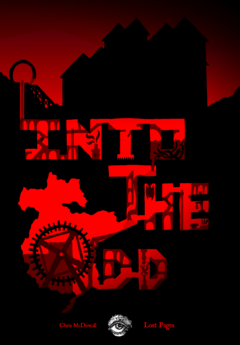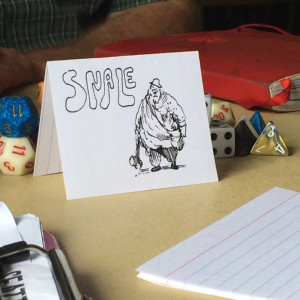 GM: Harry Lee
GM: Harry Lee
Players: Joe England, Kurt Ellison, Nate Marcel, and Sean Nittner
System: Into the Odd
Into the Odd is a quirky OSR game by Chris McDowell. The intro line for the game:
You seek Arcana, strange devices hosting unnatural powers beyond technology. They range from the smallest ring to vast machines, with powers from petty to godlike. Beside these unnatural items that they may acquire, your characters remain grounded as mortals in constant danger.
Our game
Henry had run ITO once before and it was clear that Joe was a big fan of the system. We played a pretty casual game of professional dungeons crawlers in a sewer that collapsed and exposed even older tunnels below.
The “odd” that Harry created was good fun. Apes with translucent skin, blind crows, maniac old divers, other lost adventurers, and some machine artifice that transformed the apes into metal plated killing machines. All the while being explored by a 3rd Grade Custodian and fellow treasure seekers.
What Rocked
Harry’s Odd world was unsettling without being horrific, full of wonder and surprise. Having other human interaction (the crazy old man, the lost adventurer) was great, and his monsters, and some kind of mad arcane lab were eerie and exciting.
Mechanics wise removing the roll to attack (all attacks hit) had a very interesting effect. It meant that fighting went on as expected (each side doing damage to the other) and that the standard d20 roll could be co-opted to serve other purposes. It became the all purpose “can you do or resist a thing” without being conflated with the ever present “can you hit a thing”.
This matters because in games with hit points it’s often a hard call for a GM when players try something outside of core mechanics to figure out a place for the effect. Example: Lets say the Orc has 10 hit points and your sword does 1d6. It’s going to take a couple hits to kill him. If a clever player however says “I know Orcs are sensitive to light, I cast a light spell right in his face and send him running.” In some games the GM may decide this impairs the orc but doesn’t defeat him, simply because the GM want’s to make sure that Orc was 10 hit points worth of challenge (i.e. it’s going to get a few whacks at you as well).
In a game where damage is automatic, that means anyone trying anything but attacking, is inherently taking a risk, and therefor the reward for unconventional ideas can justifiably be higher.
Also Nate’s character tent. Nate’s art is awesome!
What could have improved
I’ve seen this happen before. I don’t like it but I’m not sure how to prevent it. I like to play with status. Start low, go high for a bit, come back down. When you can shift around, status is great. When you get stuck in a rut, it’s not so much fun.
I started a character and established that she was a custodian, which, given that we were in the sewers endowed her with some authority and expertise. I got really in to naming things. My pistol was a Mark 4 Tunnel Duster, my cloak was standard issue custodial protective gear, etc. It as fun, but after a bit I decided to put a crack in her confident shell and have my character say she was out of her league. These things we were encountering weren’t in the Custodian’s Guide. What happened then was a permanent shift from a state of respect to one of mockery. And yes, the concept of a custodian with military precision and decorum was silly to begin with, but hey, who likes being teased.
I accepted the derision with cheer for a bit – I mean the intent had been to show myself fallible – but the pendulum didn’t swing back, and I felt like my credibility was shot for the rest of the game. Nobody was cruel, I could just tell I was no longer being taken seriously. Eventually we encountered an NPC that I opted to talk to, which had a certain reset effect in that I was interacting with the GM instead of the fellow players, and because the NPC had useful information, I was able to rejoin the conversation.
More generally speaking I think when there aren’t any other social structures to adhere to, a common behavior that emerges is teasing each other. It’s kind of reverse pecking order. The first person that get’s teased is knocked down a peg and from there shit just keeps sliding downhill, with folks sniping at each other. Like kids roughhousing in a pool the pattern becomes “I raise myself up by pushing you down.”
The rule of thumb I take from this is to play games with a social construct already in place. Something for people to play off of instead of playing off each other. “You’re all office workers who have been forced by your miserable boss to plan a social event” or “You’re all X-wing fighter pilots sent on a mission to find a missing droid.” In lieu of a starting situation, the play to find out games where the goal isn’t about accomplishing a thing, but instead is about following the characters around, do a great job of showing that everyone contributions are important. Of course you’re not going to laugh at Brace for missing that shot, because now the entire biker gang is coming after you and you’ve got to do something fast or your finger bones will be handlebar ornaments!
This can be pretty challenging to do in a dungeon delve, but there are games that do give focus. Torchbearer with goals. Dungeon World with bonds, etc.
